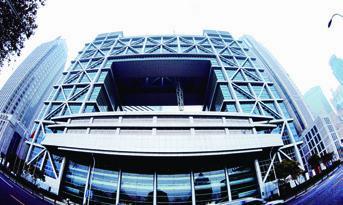Safe and Secure
By Li Xiaoyang

After four rounds of review and deliberations starting in 2015, the longawaited revised Securities Law of the Peoples Republic of China fi nally took effect on March 1. It marks a key moment for China on further liberalizing its capital market and improving the market environment to enhance market appeal and better serve the real economy.
The new law stipulates regulations for securities issuance and trading, the takeover of listed companies, information disclosure and protection of investors. The major revisions include expansion of the registration-based initial public offering(IPO) system which streamlines the approval procedures for companies to float shares in mainland stock markets, stricter requirements on information disclosure, and tougher penalties for illegal and unfair market practices. It also outlines rules to improve the delisting system in the securities markets and encourage the development of investment institutions to make the A-share market sounder.
“The revised law shows Chinas efforts to develop a more market-oriented and rule-based capital market, which can accelerate its implementation of reforms and boost investors confidence,” Wang Yang, a finance researcher at the Development Research Center of the State Council, told China Economic Times.
Remarkable changes
Although China has taken consistent steps to improve the capital market in recent years, major problems such as market violations still remain. Xu Hongcai, Deputy Director of the Economic Policy Commission, China Association of Policy Science, told Beijing Review that the capital market had unsophisticated systems, insuffi cient punishment for law violations and high costs for individuals to litigate, which are expected to be addressed as the new law takes effect.
China is shifting from an approval-based IPO system to a registration-based one. Under the current IPO system, new shares of the A-share market traded on the Shanghai and Shenzhen stock exchanges are subject to the approval of the China Securities Regulatory Commission (CSRC). To inject impetus into the capital market, the law has expanded the registration-based IPO system, which has been piloted on the Shanghai Stock Exchanges sci-tech innovation board since July of last year. ChiNext, Chinas NASDAQ-style board in the Shenzhen Stock Exchange, is expected to see its first registration-based IPO system later this year, according to a circular released by the State Council on February 29.
The measures for expanding the system include lowering the requirements for issuing shares by focusing on operational sustainability instead of sustained profitability, canceling the Issuance Examination Commission-based system to make the process easier, and improving information disclosure requirements.
“The registration-based system will improve the efficiency of IPO application and reduce the waiting time for listing candidates, allowing the market to play a key role in the pricing and pace of IPOs and reducing administrative controls on trading in the A-share market,” Dong Dengxin, Director of the Finance and Securities Institute at Wuhan University of Science and Technology, told Beijing Review, adding that the measures will make the capital market more inclusive for companies with different business modes and benefi t investors in the long term.
The new registration-based bond issuance rule is expected to ease the fi nancing strain of domestic fi rms. According to China Securities Journal, 23 companies had registered at stock exchanges as of March 10, which is expected to raise 191 billion yuan($27.44 billion).
Yan Xiang, an analyst with Shenzhenbased Guosen Securities, told ThePaper.cn that the streamlined and adjusted procedures of securities issuance under the law will ease a large number of innovation-oriented tech enterprises listing, allowing them to contribute to Chinas economic growth.
The CSRC recently agreed on the registration of the IPO of RocKontrol (Beijing) Industry Co., a hi-tech company focusing on the Internet of Things on the sci-tech board, making it the fi rst company to gain permission this year.
In addition, the new system can improve the competitiveness of listed companies and promote the capital market to better serve the real economy, Liu Junhai, Director of the Business Law Center at Renmin University of China, told China Securities Journal.
According to Xu, the registration-based IPO system centers on information disclosure. The new law highlights how regulators have shifted from vetting listed candidates to ensuring full disclosure of information, which calls for more prudent investment decisions.
To enhance protection of investors rights and interests, the law has also improved penalties for illegal practices including confiscating illegal proceeds and imposing tougher administrative punishments for irregularities. It has pledged to further protect investors, especially small and individual ones, encourage small and individual investors to fi le class action lawsuits and seek compensation in civil litigation.
It has toughened punishment for companies and individuals engaging in illegal activities such as fi nancial fraud, insider trading and market manipulation. Compared to the original cap of 600,000 yuan ($86,375), the revised law has raised the maximum penalties on intermediaries and professional services fi rms involved in fraudulent IPOs to 20 million yuan ($2.8 million).
“The provision can serve as a deterrent since it makes market violations more costly,” Ren Yuan, a partner at Shanghaibased AllBright Law Offi ce, told Xinhua News Agency.
More mature
As the revised Securities Law vows to expand the application of the registration-based IPO system to facilitate the entry of fi rms into the A-share market, it also focuses on improving the delisting system and boosting investment institutions to become more investorfriendly and make the capital market more mature.
The delisting system is expected to help squeeze malperforming firms out of the market as investors options increasingly widen. Changsheng Biotechnology, a major vaccine producer based in Changchun, Jilin Province in northeast China, was asked to delist by the Shenzhen Stock Exchange due to market malpractice in late 2018. The process was completed in November 2019 after trading of its shares was suspended for eight months. Before that, its stock price dropped sharply, causing great losses to investors.
“A sound mechanism of effi cient delisting can channel investment into high-quality companies and phase out zombie enterprises with junk stocks, which can improve the capital market,” Dong said. Data from the CSRC showed that a record 18 companies were delisted from the A-share market in 2019.
Dominated by individual investors with strong speculative sentiments, Chinas stock markets have remained volatile. According to Xu, the transaction share of individuals in the A-share market still stands at about 80 to 90 percent, higher than those of mature capital markets across the globe. Since the phenomenon can be attributed to the lack of institutional investors, the revised law encourages the development of investment institutions such as securities and fund management companies, as well as traditional fi nancial institutions like banks, to help individuals with investment management.
“The measures can help reduce individual investors in the stock market, better protect their interests and improve market effi ciency,” he said.
The road ahead
The revised Securities Law has made notable innovations, according to Xu, while the government still needs to improve its provisions, ensure enforcement and promote financial innovation to make the securities markets more market-oriented, rule-based and internationalized.
Traditional financial and intermediary institutions should be encouraged to participate in direct financing to build more diversified and multi-tiered capital market systems to protect the interests of investors and boost the real economy. Regulation and control also need to be improved to resolve fi nancial risks, he added.

Although the promotion of the registration-based IPO system is strengthened by the law, the road is not going to be smooth. As Liu stressed, the trial of the system on the sci-tech board has seen initial progress and can be widely adopted for the issuance of stocks and bonds, but the number of registered companies is below expectations and the effects remain to be observed. Most importantly, the reforms need to be launched step by step.
The current priority is to improve the rules and regulations and supporting systems for the revised law, Liu said, while Yi Huiman, Chairman of the CSRC, told Xinhua that the CSRC will draft and revise supporting provisions in line with the revised law to improve the capital market regulatory system.
To build the domestic capital market soundly, China will also improve its bond market. Data from the Peoples Bank of China showed that Chinas total outstanding bonds had reached 100.4 trillion yuan ($14.43 trillion) by the end of January, making it the worlds second largest bond market.
In 2019, the net financing of corporate bonds accounted for nearly 13 percent of the total value of social fi nancing. Corporate bond issuance has become the second largest fundraising channel for domestic enterprises besides getting loans, the central bank said.
According to Li Shuguang, dean of the graduate school at China University of Political Science and Law, the revised Securities Law highlights improving regulations on corporate bond issuance but does not cover the interbank bond market, which may cause systemic financial risks. “Since China has seen a rapidly growing bond market, it needs to continue to formulate bond laws for targeted regulation,” he told Beijing Review.

